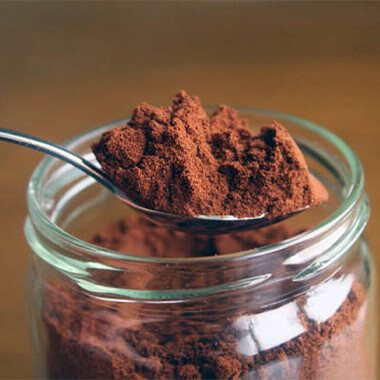Is coffee bad for you?
FEATURED RECIPE
Classic Coffee Rub

Coffee isn’t just for your morning cup! As part of a meat rub, it adds great depth of flavor. Though initially popular for steaks, it tastes great on chicken and fish too!
Ingredients
- 2 TBSP ground dark roast coffee
- 1 TBPS unsweetened cocoa powder
- ½ tsp cinnamon
- ½ tsp olive oil
- ¼ tsp kosher salt
- ¼ tsp black pepper
Instructions
Combine ingredients. Coat your meat of choice and cook as usual. You can also marinate the meat in mixture.
If you would like to make larger quantities for future uses, simply double or triple the dry ingredients. Wait until you are ready to cook to add oil.
Click for 6 more coffee rub recipes
One Small Thing: Coffee Certifications
Certifications are voluntary and require an independent agency inspector. Distributors pay farmers extra for certified coffee.
- Organic – avoids use of synthetic chemical during production, as well as processing and handling.
- Fairtrade – seeks to improve livelihood of small producers; given to associations.
- Rainforest Alliance – grown with conservation of forest, soil, river, and wildlife; also requires safe working conditions and decent wages.
- Bird-Friendly – promotes shade-grown organic coffee.
- UTZ – promotes environmental goal of reducing use of water, energy, and pesticides.
- Starbucks CAFÉ – supports sustainable practice, in terms of economic, social, and environmental aspects.
- 4C – addresses social, economic, and environmental standards for all aspects of production.
Coffee, Caffeine, And Conscience
Worldwide, many people start their day with a pick-me-up. Coffee and tea are the most common choices. In the United States, coffee is the hands-down favorite. Two-thirds of Americans drink it every day, totaling around 517 million cups every day! Worldwide consumption is 2 billion daily cups. Demand is predicted to triple by mid-century. Following coffee, the next most popular beverages in the US are bottled water, tea, tap water, soft drinks, and juice.
Potential Benefits
While most consumers seek it out for the energy boost, along with the taste, coffee boasts many possible benefits.
- The boost to energy levels is significant enough, it is even known to improve athletic performance.
- Coffee consumption has been associated with lower risk of Type 2 diabetes. Potential mechanisms include preservation of beta cell function, antioxidant-mediated improvements to insulin sensitivity, and decreased inflammation.
- Research results have varied, but coffee may support long-term brain health, lower risk of depression, increase longevity, and protect the heart and liver.
- Coffee seems to support weight management via alterations in fat storage and benefits to gut health.
Bear in mind that the potential benefits of drinking coffee come from its polyphenol content. Drinking caffeine in other forms, such as energy drinks would not translate to the same benefits. Furthermore, the benefits can be outweighed when we add things like sugary syrups and whipped cream.
Is it Dehydrating?
A commonly held notion is that caffeinated beverages are dehydrating. While caffeine is a diuretic, meaning it increases urine production, research shows that the fluid component of caffeinated beverages counterbalances that effect. You may find yourself running to the bathroom more often when you’re drinking coffee, but you don’t lose more fluid than you’re drinking. Research shows it takes more than 5 cups (500 mg caffeine) daily to produce any clinical dehydration. Those accustomed to caffeine consumption also have a higher tolerance.
Environmental Impact
Unfortunately, coffee production raises alarms associated with environmental and human rights concerns. Much of the environmental impact relates to deforestation. Land use will need to double by mid-century to meet demand, and 60% of currently suitable land is forested. Meanwhile, climate change is expected to reduce suitable land due to shortened rain seasons and increased droughts. In addition, processing coffee requires high amounts of water, 37 gallons per 4.2 ounces of coffee.
Not only are people drinking more coffee, but their tastes are also becoming more particular. Roasters are opting for freight trains in place of cargo ships, to deliver a fresher product. The result is 100 times more carbon dioxide emission per distance traveled.
Finally, coffee production is highly labor intensive at all stages. Coffee is a global, multi-billion dollar industry, but the majority of small farmers live below the international poverty line. Much of the value is added during roasting in non-producing countries, so farmers typically receive 7-10% of coffee’s final retail price per kilogram. Workers are subjected to long hours in intense heat with exposure to dangerous chemicals.
If all this concerns you, but you still want coffee’s benefits, don’t despair. Multiple certifications exist which apply to one or more aspects of coffee production. See info box to the right for more details.
Alternatives
Some people are looking to ditch the coffee habit to avoid jitters, crashes, or upset stomach. Luckily, tea provides many similar benefits to coffee. Both are rich in polyphenols, while specifics do vary. While black and green teas contain less caffeine than coffee, they also contain L-theanine, which slows caffeine absorption and results in a steadier energy boost. There are also two particular teas that contain caffeine content more comparable to coffee: matcha and yerba mate.
Brewed chicory provides a flavor very similar to coffee. Though caffeine-free, it does provide inulin, which may improve gut health.
The market for coffee alternatives is growing. You can find a dizzying array of choices, many of which make additional health claims. In particular, you may see more drinks containing adaptogens. We will address this hot topic in an issue early this Fall. Stay tuned!
For Further Reading
- Bon Appetit “13 Excellent Coffee Substitutes.”
- Food and Beverage Insider “Coffee consumption hits record high in US”
- Healthline “9 Unique Benefits of Coffee”
- Healthline “9 Alternatives to Coffee (And Why you Should Try Them)
- Healthline “Coffee v. Tea”
- Killer SC et al. “No evidence of dehydration with moderate daily coffee intake.” PLoS One. 2013 Jan 9;9(1).
- Perkins C. “Wonder about the impact of your daily cup coffee?” Ideas.Ted.Com. July 27. 2022.
- University of Florida Extension “What is Certified Coffee?”
Published: April 14, 2023; vol. 70


Comments